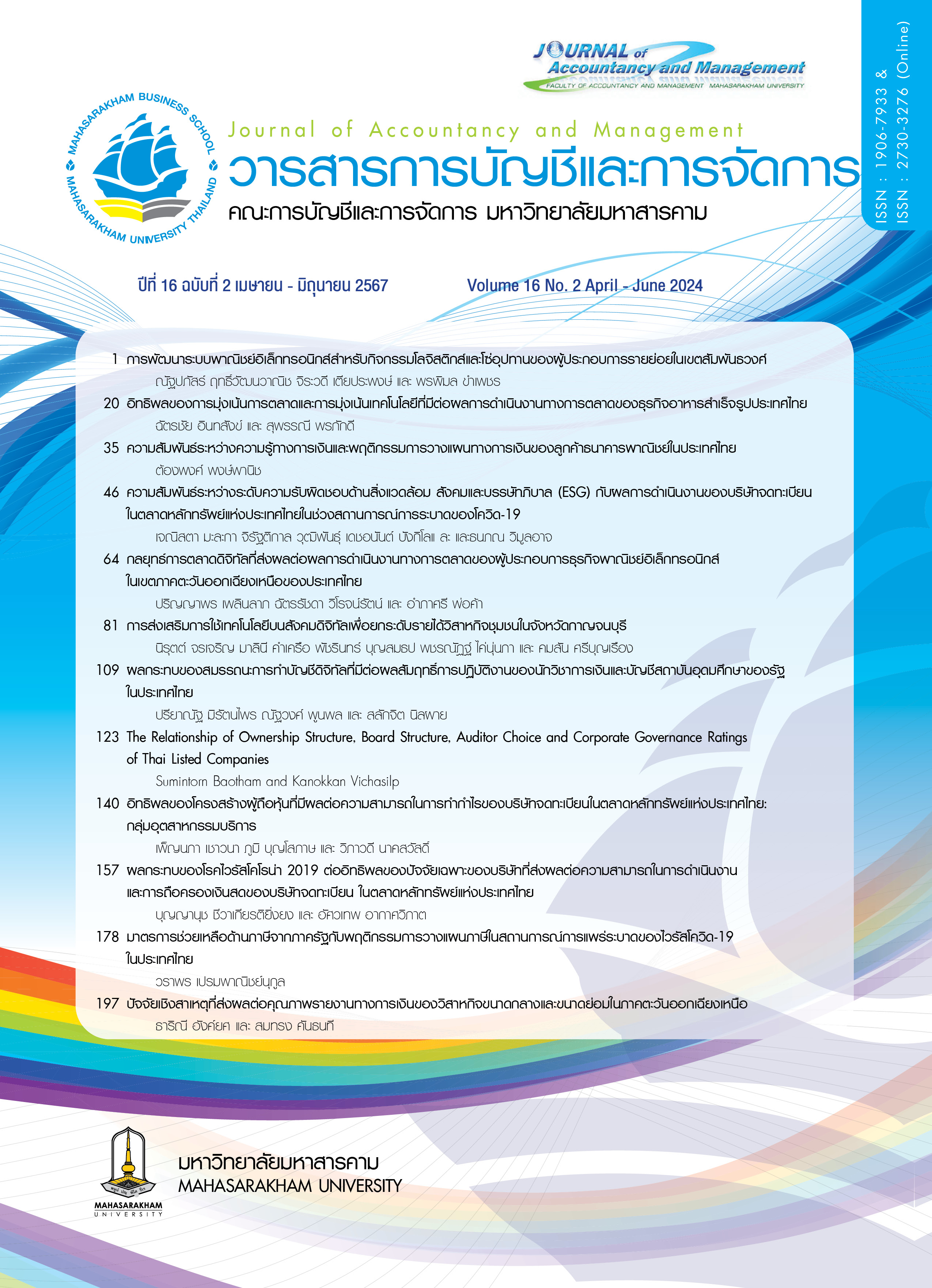ผลกระทบของสมรรถนะการทำบัญชีดิจิทัลที่มีต่อผลสัมฤทธิ์การปฏิบัติงานของนักวิชาการเงินและบัญชีสถาบันอุดมศึกษาของรัฐในประเทศไทย
Main Article Content
บทคัดย่อ
งานวิจัยนี้มีวัตถุประสงค์ เพื่อศึกษาผลกระทบของสมรรถนะ การทำบัญชีดิจิทัลที่มีต่อผลสัมฤทธิ์การปฏิบัติงานของนักวิชาการเงินและบัญชีสถาบันอุดมศึกษาของรัฐในประเทศไทย งานวิจัยนี้เป็นงานวิจัยเชิงปริมาณ เก็บข้อมูลโดยใช้แบบสอบถามกับนักวิชาการเงินและบัญชี จำนวน 240 คน ที่ปฏิบัติงานในสถาบันอุดมศึกษาของรัฐในประเทศไทย สถิติที่ใช้ในการวิเคราะห์ข้อมูล ได้แก่ ส่วนเบี่ยงเบนมาตรฐาน การแจกแจงความถี่ ค่าร้อยละ ค่าเฉลี่ย การวิเคราะห์สหสัมพันธ์ และทดสอบสมมุติฐานโดยการวิเคราะห์การถดถอยแบบพหุคูณ ผลการวิจัยพบว่า 1) สมรรถนะการทำบัญชีดิจิทัล ด้านความรู้รอบด้านเทคโนโลยี มีความสัมพันธ์และผลกระทบเชิงบวกกับผลสัมฤทธิ์การปฏิบัติงานโดยรวม 2) สมรรถนะการทำบัญชีดิจิทัล ด้านความเชี่ยวชาญในการประยุกต์ใช้เทคโนโลยี มีความสัมพันธ์และผลกระทบเชิงบวกกับผลสัมฤทธิ์การปฏิบัติงานโดยรวม และ 3) สมรรถนะการทำบัญชีดิจิทัล ด้านการวินิจฉัยสารสนเทศทางการบัญชี มีความสัมพันธ์และผลกระทบเชิงบวกกับผลสัมฤทธิ์การปฏิบัติงานโดยรวม
Downloads
Article Details

อนุญาตภายใต้เงื่อนไข Creative Commons Attribution-NonCommercial-NoDerivatives 4.0 International License.
บทความที่ได้รับการตีพิมพ์เป็นลิขสิทธิ์ของวารสารการบัญชีและการจัดการ
ข้อความที่ปรากฏในบทความแต่ละเรื่องในวารสารวิชาการเล่มนี้เป็นความคิดเห็นส่วนตัวของผู้เขียนแต่ละท่านไม่เกี่ยวข้องกับมหาวิทยาลัยมหาสารคาม และคณาจารย์ท่านอื่นๆในมหาวิทยาลัยฯ แต่อย่างใด ความรับผิดชอบองค์ประกอบทั้งหมดของบทความแต่ละเรื่องเป็นของผู้เขียนแต่ละท่าน หากมีความผิดพลาดใดๆ ผู้เขียนแต่ละท่านจะรับผิดชอบบทความของตนเองแต่ผู้เดียว
เอกสารอ้างอิง
ณัฏฐกันย์ สืบศรี และ ชนิดา ยาระณะ. (2564). การศึกษาแนวทางการพัฒนาการปฏิบัติงานด้านการเงินและบัญชีในสำนักงานศึกษาธิการจังหวัด สังกัดสำนักงานปลัดกระทรวงศึกษาธิการ. วารสารบริหารศาสตร์ มหาวิทยาลัยอุบลราชธานี, 10(1), 76-97.
ณัฐวงศ์ พูนพล นาถนภา นิลนิยม และ อิงอร นาชัยฤทธิ์. (2566). ผลกระทบของการรายงานความรับผิดชอบต่อสังคมที่มีผลต่อความเชื่อมั่นของนักลงทุนของบริษัทจดทะเบียนในตลาดหลักทรัพย์แห่งประเทศไทย. วารสารมนุษยศาสตร์และสังคมศาสตร์ มหาวิทยาลัยราชภัฏพิบูลสงคราม, 17(2), 463–479.
ณัฐวงศ์ พูนพล รวิฐา ทวีพร้อม นาถนภา นิลนิยม และ ปรียาณัฐ มิรัตนไพร. (2565). ผลกระทบของการพัฒนาทางวิชาชีพอย่างต่อเนื่องที่มีต่อ ผลสัมฤทธิ์ในการทำงานของผู้ทำบัญชีสหกรณ์การเกษตรในภาคตะวันออกเฉียงเหนือ. วารสารการบัญชีและการจัดการ มหาวิทยาลัยมหาสารคาม, 14(3), 1–17.
นันทวรรณ บุญช่วย. (2563). ยุคพลิกผันทางเทคโนโลยีกับการพัฒนานักบัญชีนวัตกร. วารสารบริหารธุรกิจและสังคมศาสตร์ มหาวิทยาลัยรามคำแหง, 3(1), 15-26.
นุชรี พิทักษ์ มินท์ธิตา ถึงฝั่ง และ นิติกรณ์ จันทรสุริยะศักดิ์. (2564). ผลกระทบของความเชี่ยวชาญทางการบัญชีสมัยใหม่ที่มีต่อประสิทธิภาพการทางานของนักบัญชีองค์กรปกครองส่วนท้องถิ่นในจังหวัดหนองบัวลำภู. วารสารวิจัยและพัฒนา มหาวิทยาลัยราชภัฏเลย, 16(55), 94-104.
ปรวีร์ เขียววิจิตร และ วิโรจน์ เจษฎาลักษณ์. (2561). ความพร้อมด้านเทคโนโลยีสารสนเทศ และการพัฒนาความสามารถ ด้านเทคโนโลยีสารสนเทศที่ส่งผลต่อประสิทธิผลในการปฏิบัติงานผ่านศักยภาพในการประยุกต์ใช้ในการปฏิบัติงานของบุคลากรในสังกัดสำนักงานปลัดกระทรวงการท่องเที่ยวและกีฬา. Veridian E-Journal, Silpakorn University, 11(2), 781 – 791.
พระราชบัญญัติ การบริหารงานและการให้บริการภาครัฐผ่านระบบดิจิทัล พ.ศ. 2562. (2562). ราชกิจจานุเบกษา (เล่ม 136 ตอนที่ 67 ก., น.57).
พิธุวรรณ กิติคุณ. (2559). ภาครัฐไทยกับการก้าวสู่รัฐบาลดิจิทัล [เอกสารวิชาการ]. สำนักวิชาการ และสำนักเลขาธิการผู้แทนราษฎร.
เพ็ญนภา เกื้อเกตุ ภูริชาติ พรหมเต็ม และ วิโรจน์ ไพบูลย์เวชสวัสดิ์. (2563). ความสัมพันธ์ระหว่างความเป็นมืออาชีพของนักบัญชียุคดิจิทัลและประสิทธิภาพการดำเนินงานของกิจการห้างหุ้นส่วนจำกัดในจังหวัดยะลา. วารสารการบัญชีและการจัดการ มหาวิทยาลัยมหาสารคาม, 12(1), 154-166.
เมธาพร นามศรี ณัฐวงศ์ พูนพล และ สุมิตรา จิระวุฒินันท์. (2563). ผลกระทบของทักษะด้านเทคโนโลยีสารสนเทศที่มีต่อประสิทธิผลในการบริการข้อมูลทางการบัญชีของนักบัญชีธุรกิจขนาดกลางและขนาดย่อมในภาคะวันออกเฉียงเหนือ. วารสารการบัญชีและการจัดการ มหาวิทยาลัยมหาสารคาม, 12(2), 71-86.
วัชนีพร เศรษฐสักโก. (2560). ระบบสารสนเทศทางการบัญชี (พิมพ์ครั้งที่ 9). กรุงเทพฯ : วี.เจ.พริ้นติ้ง.
สมบัติ ท้ายเรือคำ. (2552). ระเบียบวิธีวิจัยสำหรับมนุษยศาสตร์และสังคมศาสตร์ (พิมพ์ครั้งที่ 8). มหาสารคาม: มหาวิทยาลัยมหาสารคาม.
สำนักงานปลัดกระทรวงการอุดมศึกษา วิทยาศาสตร์ วิจัยและนวัตกรรม. (2561). สถิติอุดมศึกษา ปีการศึกษา 2561, สำนักงานปลัดกระทรวงการอุดมศึกษา วิทยาศาสตร์ วิจัยและนวัตกรรม.
สิทธิชัย ทรัพย์แสนดี และดารณี เอื้อชนะจิต. (2564). การบริหารสำนักงานบัญชีดิจิทัลที่ส่งผลต่อประสิทธิผลในการปฏิบัติงานของสำนักงานบัญชีดิจิทัลในประเทศไทย. Journal of Roi Kaensarn Academi, 6(10), 125 – 140.
Aaker, D. A., Kumar, V., & Day, G. S. (2001). Marketing Research. 7th ed. New York : John Wiley and Sons.
Al-zwyalif, I. M. (2013). IT governance and its impact on the usefulness of accounting information reported in financial statements. International Journal of Business and Social Science, 4(2), 83–95.
Black, K. (2006). Business statistics: for contemporary decision making. 4th ed. New York : John Wiley and Son.
Deng, H., Duan, S. X., & Wibowo, S. (2022). Digital technology driven knowledge sharing for job performance. Journal of Knowledge Management, 27(2), 404-425.
Gulin, D., Hladika, M., & Valenta, I. (2019). Digitalization and the challenges for the accounting profession. Conference Paper Leibniz-Informationszentrum Wirtschaft Leibniz Information Centre for Economics, 502-511.
Hair, J. F., Black, W. C., & Erson, R. E. (2006). Multivariate Data Analysis. 6th ed. New Jersey : Pearson.
Lawson, R. (2018). Management Accounting Competencies: Fit for Purpose in a Digital Age. Accounting Leaders Tap Technology as Top concern.
Ogan, Y., Peter, G., May-Yin, D. C. (2022). Digital transformation and accountants as advisors. Accounting, Auditing & Accountability Journal, 36(1), 209-237.
Petani, F, J., & Mengis, J. (2021). Technology and the hybrid workplace: the affective living of IT-enabled space. The International Journal of Human Resource Management, 34(8), 1530-1553.
Zesu, H., & Yihua, Y. (2023). Digital transformation and the impact of local tournament incentives: Evidence from publicly listed companies in China. Journal of Finance Research Letters, 57(4).


